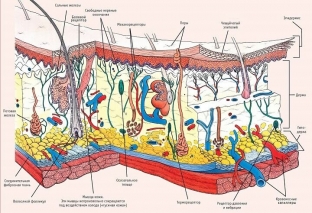Hypersensitivity of the skin can have a different nature: allergic reactions to certain ingredients of cosmetic preparations, skin damage, inflammation caused by irritation of sensitive nerve endings, congenital "weakness"; barrier structures (in patients with atopic dermatitis). But all these reasons have common roots.
Almost always, the first link in the development of hypersensitivity of the skin becomes a violation of its integrity and an increase in the permeability of the stratum corneum. That is why the main effort in developing a strategy for the care of sensitive skin should be directed to the restoration of the epidermal barrier.
Peculiarities of procedures for hypersensitivity of the skin
Procedures accompanied by damage to the skin barrier layer (mechanical, chemical, laser peels) should be preceded and completed by cosmetic care that restores the barrier, antioxidant and anti-inflammatory therapy, a set of measures that normalize the processes of physiological regeneration of the epidermis.
When performing any procedure, a patient with hypersensitivity of the skin should, if possible, avoid the use of aggressive methods and irritants, since if the sensitivity threshold is exceeded, and so low enough, the procedure can lead to uncontrolled inflammation of the skin. Such people have an increased risk of developing pathological processes on the skin, which you can read about further on estet-portal.com. The patient should be warned about the possibility of unpleasant sensations and focus not only on the appearance of the skin, but also on the subjective sensations of the person himself, in order to stop the effect of the drug in time.
What diseases are more likely to develop with increased skin sensitivity?
Modern dermatology defines sensitive or reactive skin as having an increased tendency to develop dermatitis – inflammatory reaction of the skin.
Depending on the pathogenesis, different types of skin reactivity are distinguished: allergic, contact, seborrheic dermatitis, urticaria, eczema.
It is known that the basis of such chronic skin diseases as eczema, atopic dermatitis is a violation of the barrier function of the skin. However, this pathology occurs or worsens with stress. Do not forget that the basis of allergic diseases is also an imbalance in the mechanisms of the immune system.
Diseases that often develop with hypersensitivity of the skin:
- Allergic dermatitis develops in response to the impact of any ingredient in cosmetics, is a significant problem in cosmetology. In this case, at first there is a memorization of one or another substance (allergen) by immune cells and sensitization of cells and tissues of the body. When this substance is repeatedly applied to the area of \u200b\u200bsensitivity of the skin, an immune reaction develops, accompanied by inflammation. Usually this phenomenon is local in nature and is accompanied by the appearance of redness, nodules, blisters; the lesion has no clear boundaries.
- Contact dermatitis develops when a caustic or toxic substance comes into contact with the skin.
In cosmetic formulations, you can find a large number of substances that have the potential to damage skin cells. These include surfactants (natural soap: pH=9–11), universal chemical solvents (alcohol and acetone), acids.
The severity of contact dermatitis depends on the concentration of the damaging substance, its chemical structure, the state of the stratum corneum and other factors. The boundaries of the lesion are clearly defined.

Recommendations for patients with hypersensitivity of the skin
It is important to make it clear to patients with sensitive skin that they should always treat it with care and not cause damage to it. Weakened skin barrier – this is their feature, you need to learn to coexist peacefully with it. Correctly, adequately selected cosmetics for home care and qualified cosmetic procedures can significantly help them in this.
Patients with hypersensitivity of the skin should be warned by the doctor that this is their peculiarity, they should always treat the skin with care, not provoke damage to it. The doctor must choose the right cosmetics for home care and choose cosmetic procedures for a patient with hypersensitivity of the skin.







Add a comment